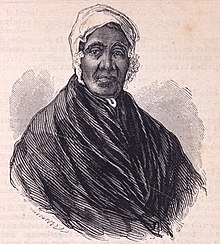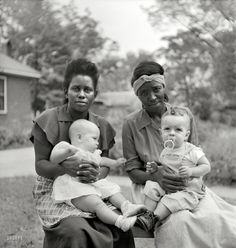I do not mean to criticize John D. Rockefeller, Andrew Carnegie, Cornelius Vanderbilt, Warren Buffett or Bill Gates. They gave away (Buffett and Gates continue to do so) untold millions, even billions of dollars for various causes, including health, education and the amelioration of poverty. But they are pikers compared to Catherine Ferguson. She was my kind of philanthropist!
amelioration of poverty. But they are pikers compared to Catherine Ferguson. She was my kind of philanthropist!
A slave, an entrepreneur and an angel
Born into slavery in 1779, she was eight when her mother was sold off—never to be seen by Ferguson again. With the aid of a couple of beneficent people, her freedom was purchased in 1815. She married and had two children, both of whom died in infancy. Her husband quickly followed suit. Ferguson did not abandon hope, however. Despite being illiterate, she started a business. The cakes she baked were said to be the best in New York City. Ferguson must have been a very compassionate soul because she opened her home for religious instruction on Sundays. Her work was so moving that a preacher offered her a room in the basement of his church. It became known as the Murray Street Sabbath School, which is viewed by some historians as one of the USA’s first Sunday schools. Prominent people such as Isabella Graham and Isaac Ferris dropped by, observed and were suitably impressed.
 That is far from all. In an era when the poor were numerous and had to fend for themselves, she cared for dozens of children. If no home could be found, they lived with her. A foster mother to African-American and European-American kids alike, Catherine Ferguson refused to discriminate. Her death by cholera in 1854 did not go unnoticed. “Thousands in this community have heard of or known Katy Ferguson, the celebrated cake-maker for weddings and other social parties,” read one obituary. “But many may be ignorant of the extraordinary good deeds which crowned her life.” Homes for unwed mothers bearing her name were opened in New York in 1920 and in Detroit in 1986.
That is far from all. In an era when the poor were numerous and had to fend for themselves, she cared for dozens of children. If no home could be found, they lived with her. A foster mother to African-American and European-American kids alike, Catherine Ferguson refused to discriminate. Her death by cholera in 1854 did not go unnoticed. “Thousands in this community have heard of or known Katy Ferguson, the celebrated cake-maker for weddings and other social parties,” read one obituary. “But many may be ignorant of the extraordinary good deeds which crowned her life.” Homes for unwed mothers bearing her name were opened in New York in 1920 and in Detroit in 1986.
Lola Mae
Our second heroine is Lola Mae Hunter (1917−2016). I know regrettably little about her background, but I think she spent most of her life in Dallas and Grand Prairie, a smaller town on the road to Fort Worth. Her husband was named Jimmie Lee, and they attended Dalworth Park Church of Christ for more than 50 years. I knew Lola Mae personally, so I will use her first name—fully aware that in the days of slavery and Jim Crow, European-Americans paternalistically called African-Americans by their first names; “Mr.,” “Mrs.” and “Miss” connoted far too much respect. I trust the reader knows I am not adhering to any such policy. Back then, it was also frowned upon to call black women “ladies.” Well, these two were most assuredly ladies.
Lola Mae was the maid of my maternal grandmother, Catherine Cox. Grandmother’s house at 227 South Lancaster in Oak Cliff was kept clean by her weekly visits. A closet just off the kitchen with mops, brooms and all sorts of cleaning chemicals was understood to be Lola Mae’s domain and off-limits to the rest of us. I want to describe her as carefully as possible. She was a full-blooded daughter of Africa. Who said there is anything wrong with being dark? Although quite gentle with me  and my brothers, she was big and strong—a husky woman, no doubt. Oh, how I wish I had taken the time to ask about her life. But realistically, what would she have told a white-boy naif like me? I do remember that she had once bought a plot of land (presumably in a segregated part of Dallas) and hired a carpenter to build a house. Like Catherine Ferguson, she and her husband took in kids from chaotic homes or who had no homes at all. I admired her deeply (indeed I loved her) for this.
and my brothers, she was big and strong—a husky woman, no doubt. Oh, how I wish I had taken the time to ask about her life. But realistically, what would she have told a white-boy naif like me? I do remember that she had once bought a plot of land (presumably in a segregated part of Dallas) and hired a carpenter to build a house. Like Catherine Ferguson, she and her husband took in kids from chaotic homes or who had no homes at all. I admired her deeply (indeed I loved her) for this.
Our final encounter
My grandmother was by no means Lola Mae’s only employer. She cleaned the floors, washed the dishes, did the laundry, dusted and so forth at a series of homes, finishing at one and riding the bus to another—and then another. This was probably for 5 ½ days a week. I last saw Lola Mae in the early 1980s while entering a second-hand clothing store in Oak Cliff. It seems we both liked bargains. I asked, “Do you remember me?” With no hesitation, she said, “Yes, you’re Richard.”
I have read of and met European-Americans who grew up in close proximity with their African-American peers—playing, laughing, fighting and making up, and probably even engaging in rudimentary boy−girl interactions. In the olden days when middle- and upper-class mothers thought it uncool to breastfeed, their babies often had black wet nurses. None of these things encroached on my life in segregated Dallas, and I am all the poorer for it. The only exception is Lola Mae.


12 Comments
Your words ” It seems we both like bargains” makes me laugh in this afternoon.
Your article gives me worm heart.
Everybody likes a bargain, Ha-Sook!
Either of these ladies could be the subject of a movie! Very cool story, thank you! Kenneth
So true, Mr. Hausmann. I had to honor them both.
I always see something new out of writing, which is quite different from what I read every day.
Thank you for the chance to extend my view!
Thanks, Anthony. I know this stuff would be hard for a non-American to understand. We have a twisted history, but maybe the same can be said for many other countries!
These two ladies are considered as unsung heroes .There are countless heroes in our everyday life the world over . They may not have reward in their lifetime but in life hereafter.
So true, Renalie. Neither got the recognition they deserved during their lives. This was what I could do to honor them.
Great research, Richard. I enjoyed your writing on both ladies and can’t imagine
what their lives were really like.
Thank you–thank you very much, Rex. Of course, I never got to meet Ms. Ferguson. As for Lola Mae, I have thought of her thousands of times since those long-ago days. Not just her, but the historical circumstances that put her there.
Thank you for writing such nice things about my great grandmother.
You are the granddaughter of the sainted Lola Mae?? I wish we could meet so I could learn more about her.
Add Comment